人教版高中英语选修八 Unit1 A land of diversity-语法篇(教师版)
- 格式:docx
- 大小:56.11 KB
- 文档页数:12
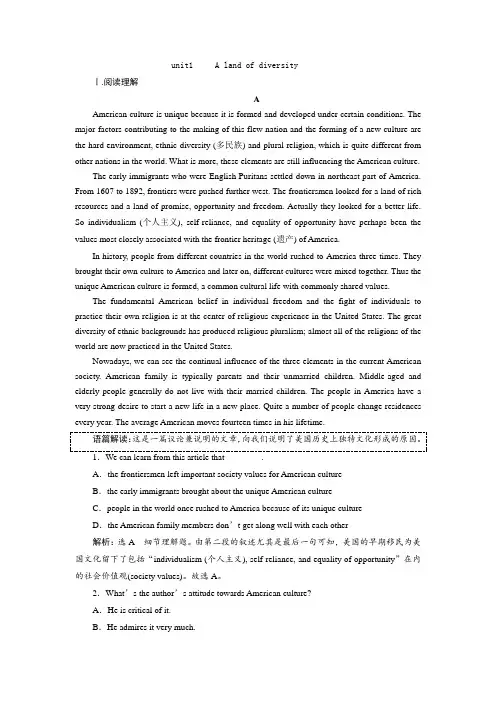
unit1 A land of diversityⅠ.阅读理解AAmerican culture is unique because it is formed and developed under certain conditions. The major factors contributing to the making of this flew nation and the forming of a new culture are the hard environment, ethnic diversity (多民族) and plural religion, which is quite different from other nations in the world. What is more, these elements are still influencing the American culture.The early immigrants who were English Puritans settled down in northeast part of America. From 1607 to 1892, frontiers were pushed further west. The frontiersmen looked for a land of rich resources and a land of promise, opportunity and freedom. Actually they looked for a better life. So individualism (个人主义), self-reliance, and equality of opportunity have perhaps been the values most closely associated with the frontier heritage (遗产) of America.In history, people from different countries in the world rushed to America three times. They brought their own culture to America and later on, different cultures were mixed together. Thus the unique American culture is formed, a common cultural life with commonly shared values.The fundamental American belief in individual freedom and the fight of individuals to practice their own religion is at the center of religious experience in the United States. The great diversity of ethnic backgrounds has produced religious pluralism; almost all of the religions of the world are now practiced in the United States.Nowadays, we can see the continual influence of the three elements in the current American society. American family is typically parents and their unmarried children. Middle-aged and elderly people generally do not live with their married children. The people in America have a very strong desire to start a new life in a new place. Quite a number of people change residences every year. The average American moves fourteen times in his lifetime.语篇解读:这是一篇议论兼说明的文章,向我们说明了美国历史上独特文化形成的原因。
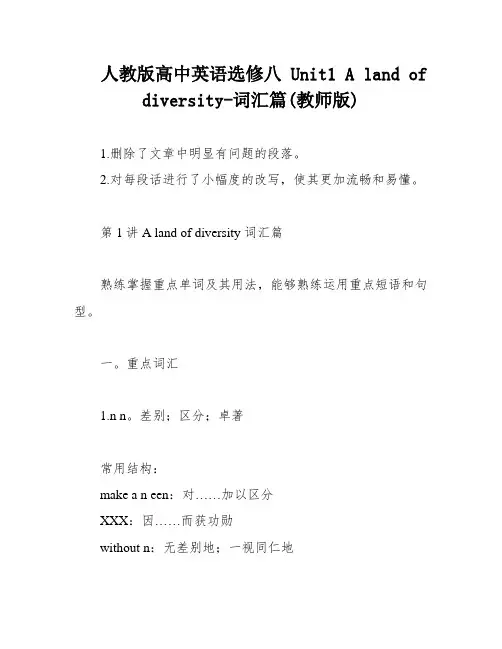
人教版高中英语选修八 Unit1 A land of diversity-词汇篇(教师版)1.删除了文章中明显有问题的段落。
2.对每段话进行了小幅度的改写,使其更加流畅和易懂。
第1讲 A land of diversity 词汇篇熟练掌握重点单词及其用法,能够熟练运用重点短语和句型。
一。
重点词汇1.n n。
差别;区分;卓著常用结构:make a n een:对……加以区分XXX:因……而获功勋without n:无差别地;一视同仁地拓展:distinct adj。
清晰的;明显的;明确的XXX。
在某方面与……不同XXX。
他有很明显的绘画天赋。
You should make your writing distinct。
你应该把字写清楚。
2.means n。
手段;方法(单数和复数形式相同)常用结构:by means of:用……办法;借助……by all means:一定,务必;好的,当然可以by no means:决不,一点也不(位于句首时,句子用部分倒装)by every means:用尽一切可能的办法易混辨析:means/way/methodmeans 指“方法、方式、工具”,着重于具体的手段(单复数形式相同)。
way 指“一般的方法、方式或个人的特殊方法、方式”,与技巧或效果的好坏无关。
method 指“有系统的、有效率的精心拟定的方法”,也可以指抽象概念“条理”。
a way to do sth。
/ a way of doing sth。
/ a method of doing sth。
做……的方法in this way / with the method / by this means:用这种/些方法by XXX:顺便问一下on one’s way to。
在去……的路上in the way:挡住路注意:XXX。
They used white paint to mark out the XXX。
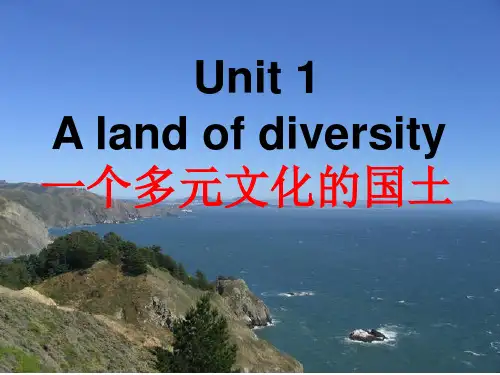
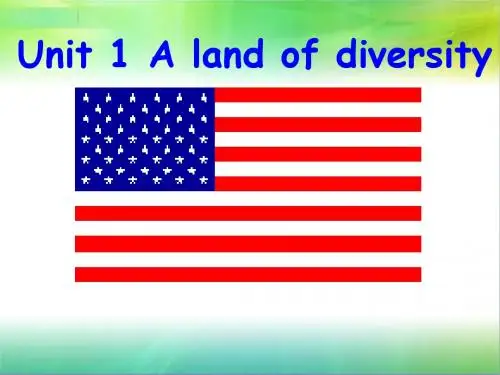
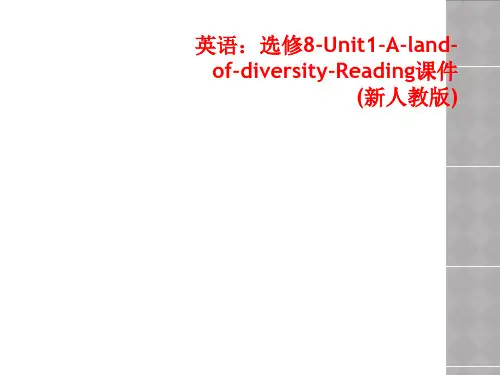
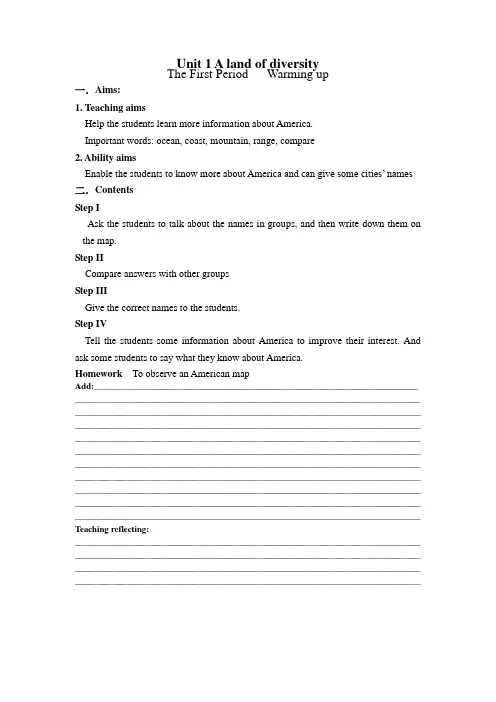
Unit 1 A land of diversityThe First Period Warming up一.Aims:1. Teaching aimsHelp the students learn more information about America.Important words: ocean, coast, mountain, range, compare2. Ability aimsEnable the students to know more about Ameri ca and can give some cities’ names 二.ContentsStep IAsk the students to talk about the names in groups, and then write down them on the map.Step IICompare answers with other groupsStep IIIGive the correct names to the students.Step IVTell the students some information about America to improve their interest. And ask some students to say what they know about America.Homework To observe an American mapAdd:__________________________________________________________________________ _______________________________________________________________________________ _______________________________________________________________________________ _______________________________________________________________________________ _______________________________________________________________________________ _______________________________________________________________________________ _______________________________________________________________________________ _______________________________________________________________________________ _______________________________________________________________________________ _______________________________________________________________________________ _______________________________________________________________________________ Teaching reflecting:_______________________________________________________________________________ _______________________________________________________________________________ _______________________________________________________________________________ _______________________________________________________________________________The Second Period Reading 一.Aims:1.Enable the students to talk about things about the USA.2.Help the students learn the huge diversity of races and cultures in America,especially in California.二.Contents:Step 1 Warming up.1.Ask the students to describe what they learn about the USA.2.Group work: look at the map of the USA with your group. Write on the map thenames of as many of the following as you can. Compare your names with other groups.Step 2 Pre-reading1.Ask the students to tell things about California including its location, size,population, economy, history etc. What do you learn about California?2.Show the students some pictures and encourage students not only to say what eachpicture is about but how each one relates to California.Step 3 Fast reading1.Read through the passage and get the main idea.2.Reading comprehension.Ask the students the following questions:1)When you look at the title, what so you think of ?A land of differences. California is a land of great differences — differences in climate, in landscape and attitude.2) Why is the USA called a melting pot?There are many immigrants to the USA and there are many cultures and nationalities. So it is a place in which people, ideas, etc of different kinds gradually get mixed together.3.Beside each date note down an important event in Californian history.Step 4 Detail readingBeside each cultural group , write the period in which they first came toStep 5 After readingWhy is California in the 21st century such a multicultural community? (Using 3 or 4 sentences to explain. )Step 6 HomeworkFinish “Learning about language” on page 4.Teaching reflecting:_______________________________________________________________________________ _______________________________________________________________________________ _______________________________________________________________________________ _______________________________________________________________________________The Third Period Language Points 一.Aims:1.Learn expressions and phrases.2.Learn language points.二.Contents:1. means: a method or a way of doing. 方式,方法,手段(但复数同形)Translate:一切可能的办法都试过了。
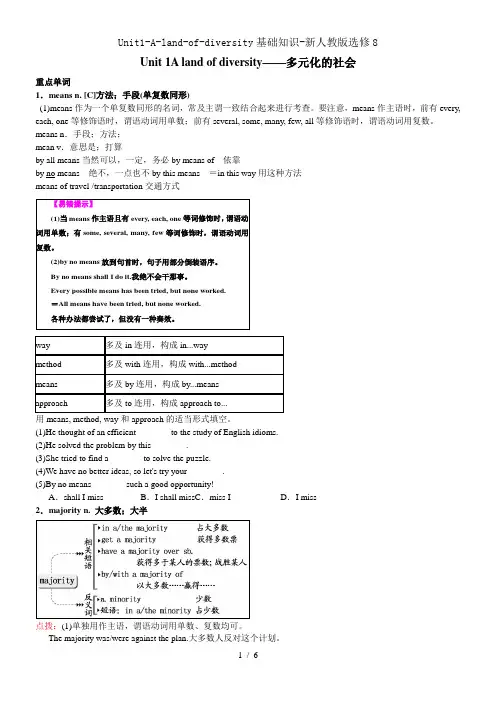
Unit 1A land of diversity——多元化的社会重点单词1.means n. [C]方法;手段(单复数同形)(1)means作为一个单复数同形的名词,常及主谓一致结合起来进行考查。
要注意,means作主语时,前有every, each, one等修饰语时,谓语动词用单数;前有several, some, many, few, all等修饰语时,谓语动词用复数。
means n.手段;方法;mean v.意思是;打算by all means当然可以,一定,务必by means of 依靠by no means 绝不,一点也不by this means =in this way用这种方法means of travel /transportation交通方式【易错提示】(1)当means作主语且有every, each, one等词修饰时,谓语动词用单数;有some, several, many, few等词修饰时,谓语动词用复数。
(2)by no means放到句首时,句子用部分倒装语序。
By no means shall I do it.我绝不会干那事。
Every possible means has been tried, but none worked.=All means have been tried, but none worked.各种办法都尝试了,但没有一种奏效。
way 多及in连用,构成in...waymethod 多及with连用,构成with...methodmeans 多及by连用,构成by...meansapproach 多及to连用,构成approach to...用means, method, way和approach的适当形式填空。
(1)He thought of an efficient________to the study of English idioms.(2)He solved the problem by this________.(3)She tried to find a________to solve the puzzle.(4)We have no better ideas, so let's try your________.(5)By no means________such a good opportunity!A.shall I miss B.I shall missC.miss I D.I miss2.majority n. 大多数;大半点拨:(1)单独用作主语,谓语动词用单数、复数均可。
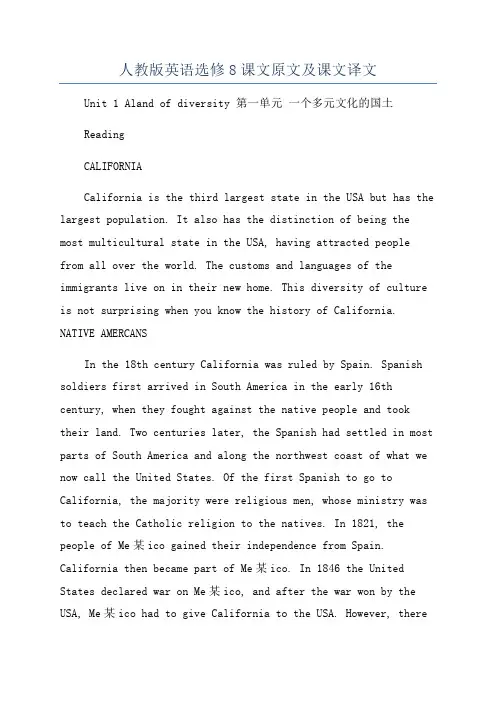
人教版英语选修8课文原文及课文译文Unit 1 Aland of diversity 第一单元一个多元文化的国土ReadingCALIFORNIACalifornia is the third largest state in the USA but has the largest population. It also has the distinction of being the most multicultural state in the USA, having attracted people from all over the world. The customs and languages of the immigrants live on in their new home. This diversity of culture is not surprising when you know the history of California. NATIVE AMERCANSIn the 18th century California was ruled by Spain. Spanish soldiers first arrived in South America in the early 16th century, when they fought against the native people and took their land. Two centuries later, the Spanish had settled in most parts of South America and along the northwest coast of what we now call the United States. Of the first Spanish to go to California, the majority were religious men, whose ministry was to teach the Catholic religion to the natives. In 1821, the people of Me某ico gained their independence from Spain. California then became part of Me某ico. In 1846 the United States declared war on Me某ico, and after the war won by the USA, Me某ico had to give California to the USA. However, thereis still a strong Spanish influence in the state. That is why today over 40 of Californians speak Spanish as a first or second language. RUSSIANSIn the early 1800s, Russian hunters, who had originally gone to Alaska, began settling in California. Today there are about 25,000 Russian-Americans living in and around San Francisco. GOLD MINERSAlthough Chinese immigrants began to arrive during the Gold Rush Period, it was the building of the rail network from the west to the east coast that brought even larger numbers to California in the 1860s. Today, Chinese-Americans live in all parts of California, although a large percentage have chosen to stay in the \Other immigrants such as Italians, mainly fishermen but also wine makers, arrived in California in the late 19th century. In 1911 immigrants from Denmark established a town of their own, which today still keeps up their Danish culture. By the 1920s the film industry was well established in Hollywood, California. The industry boom attracted Europeans including many Jewish people. Today California has the second largest Jewish population in the United States.Japanese farmers began arriving in California at the beginning of the 20th century, and since the 1980s a lot more have settled there. People from Africa have been living in California since the 1800s, when they moved north from Me某ico. However, even more arrived between 1942 and 1945to work in the ship and aircraft industries. MOST RECENT ARRIVALSCalifornia. THE FUTUREPeople from different parts of the world, attracted by the climate and the lifestyle, still immigrate to California. It is believed that before long the mi某 of nationalities will be so great that there will be no distinct major racial or cultural groups, but simply a mi某ture of many races and cultures.加利福尼亚加利福尼亚是美国的第三大州,而且是人口最多的州。
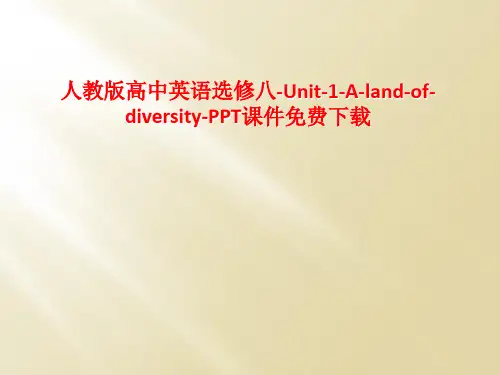
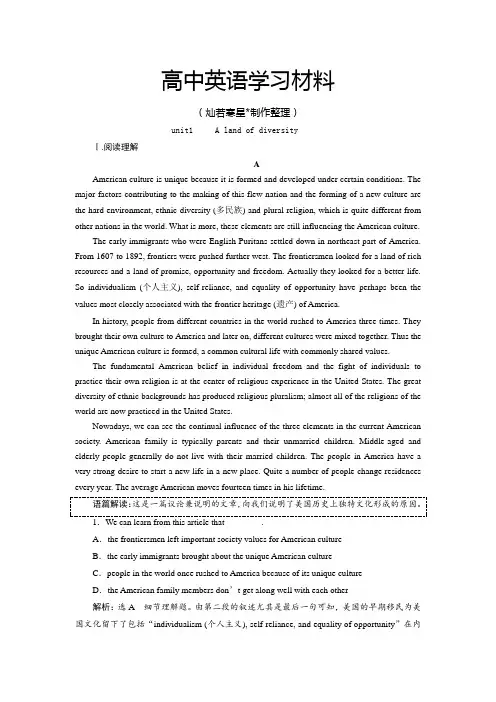
高中英语学习材料(灿若寒星*制作整理)unit1 A land of diversityⅠ.阅读理解AAmerican culture is unique because it is formed and developed under certain conditions. The major factors contributing to the making of this flew nation and the forming of a new culture are the hard environment, ethnic diversity (多民族) and plural religion, which is quite different from other nations in the world. What is more, these elements are still influencing the American culture.The early immigrants who were English Puritans settled down in northeast part of America. From 1607 to 1892, frontiers were pushed further west. The frontiersmen looked for a land of rich resources and a land of promise, opportunity and freedom. Actually they looked for a better life. So individualism (个人主义), self-reliance, and equality of opportunity have perhaps been the values most closely associated with the frontier heritage (遗产) of America.In history, people from different countries in the world rushed to America three times. They brought their own culture to America and later on, different cultures were mixed together. Thus the unique American culture is formed, a common cultural life with commonly shared values.The fundamental American belief in individual freedom and the fight of individuals to practice their own religion is at the center of religious experience in the United States. The great diversity of ethnic backgrounds has produced religious pluralism; almost all of the religions of the world are now practiced in the United States.Nowadays, we can see the continual influence of the three elements in the current American society. American family is typically parents and their unmarried children. Middle-aged and elderly people generally do not live with their married children. The people in America have a very strong desire to start a new life in a new place. Quite a number of people change residences every year. The average American moves fourteen times in his lifetime.语篇解读:这是一篇议论兼说明的文章,向我们说明了美国历史上独特文化形成的原因。
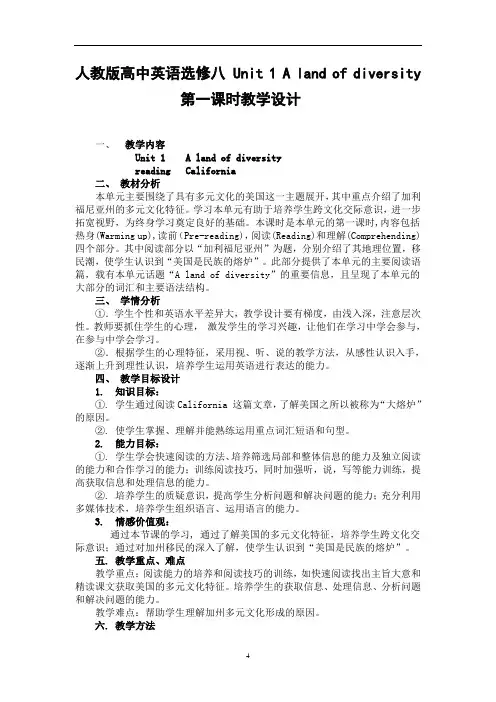
人教版高中英语选修八 Unit 1 A land of diversity第一课时教学设计一、教学内容Unit 1 A land of diversityreading California二、教材分析本单元主要围绕了具有多元文化的美国这一主题展开,其中重点介绍了加利福尼亚州的多元文化特征。
学习本单元有助于培养学生跨文化交际意识,进一步拓宽视野,为终身学习奠定良好的基础。
本课时是本单元的第一课时,内容包括热身(Warming up),读前(Pre-reading),阅读(Reading)和理解(Comprehending) 四个部分。
其中阅读部分以“加利福尼亚州”为题,分别介绍了其地理位置,移民潮,使学生认识到“美国是民族的熔炉”。
此部分提供了本单元的主要阅读语篇,载有本单元话题“A land of diversity”的重要信息,且呈现了本单元的大部分的词汇和主要语法结构。
三、学情分析①.学生个性和英语水平差异大,教学设计要有梯度,由浅入深,注意层次性。
教师要抓住学生的心理,激发学生的学习兴趣,让他们在学习中学会参与,在参与中学会学习。
②.根据学生的心理特征,采用视、听、说的教学方法,从感性认识入手,逐渐上升到理性认识,培养学生运用英语进行表达的能力。
四、教学目标设计1. 知识目标:①. 学生通过阅读California 这篇文章,了解美国之所以被称为“大熔炉”的原因。
②. 使学生掌握、理解并能熟练运用重点词汇短语和句型。
2. 能力目标:①. 学生学会快速阅读的方法、培养筛选局部和整体信息的能力及独立阅读的能力和合作学习的能力;训练阅读技巧,同时加强听,说,写等能力训练,提高获取信息和处理信息的能力。
②. 培养学生的质疑意识,提高学生分析问题和解决问题的能力;充分利用多媒体技术,培养学生组织语言、运用语言的能力。
3. 情感价值观:通过本节课的学习, 通过了解美国的多元文化特征,培养学生跨文化交际意识;通过对加州移民的深入了解,使学生认识到“美国是民族的熔炉”。
人教版高中英语选修8 课文及翻译选修8 Unit 1 A land of diversity-ReadingCALIFORNIACalifornia is the third largest state in the USA but has the largest population. It also has the distinction of being the most multicultural state in the USA, having attracted people from all over the world. The customs and languages of the immigrants live on in their new home. This diversity of culture is not surprising when you know the history of California.NATIVE AMERCANSExactly when the first people arrived in what we now know as California, no one really knows. However, it is likely that Native Americans were living in California at least fifteen thousand years ago. Scientists believe that these settlers crossed the Bering Strait in the Arctic to America by means of a land bridge which existed in prehistoric times. In the 16th century, after the arrival of the Europeans, the native people suffered greatly. Thousands were killed or forced into slavery. In addition, many died from the diseases brought by the Europeans. However, some survived these terrible times, and today there are more Native Americans living in California than in any other state.THE SPANISHIn the 18th century California was ruled by Spain. Spanish soldiers first arrived in South America in the early 16th century, when they fought against the native people and took their land. Two centuries later, the Spanish had settled in most parts of South America and along the northwest coast of what we now call the United States. Of the first Spanish to go to California, the majority were religious men, whose ministry was to teach the Catholic religion to the natives. In 1821, the people of Mexico gained their independence from Spain. California then became part of Mexico. In 1846 the United States declared war on Mexico, and after the war won by the USA, Mexico had to give California to the USA. However, there is still a strong Spanish influence in the state. That is why today over 40 of Californians speak Spanish as a first or second language.RUSSIANSIn the early 1800s, Russian hunters, who had originally gone to Alaska, began settling in California. Today there are about 25,000 Russian-Americans living in and around San Francisco.GOLD MINERSIn 1848, not long after the American-Mexican war, gold was discovered in California. The dream of becoming rich quickly attracted people from all over the world. The nearest, and therefore the first to arrive, were South Americans and people from the United States. Then adventurers from Europe and Asia soon followed. In fact, few achieved their dream of becoming rich. Some died or returned home, but most remained in California to make a life for themselves despite great hardship. They settled in the new towns or on farms. By the time California elected to become thethirty-first federal state of the USA in 1850, it was already a multicultural society.LATER A RRIVALSAlthough Chinese immigrants began to arrive during the Gold Rush Period, it was the building of the rail network from the west to the east coast that brought even larger numbers to California in the 1860s. Today, Chinese-Americans live in all parts of California, although a large percentage have chosen to stay in the "Chinatowns" of Los Angeles and San Francisco.Other immigrants such as Italians, mainly fishermen but also wine makers, arrived in California in the late 19th century. In 1911 immigrants from Denmark established a town of their own, which today still keeps up their Danish culture. By the 1920s the film industry was well established in Hollywood, California. The industry boom attracted Europeans including many Jewish people. Today California has the second largest Jewish population in the United States.Japanese farmers began arriving in California at the beginning of the 20th century, and since the 1980s a lot more have settled there. People from Africa have been living in California since the 1800s, when they moved north from Mexico. However, even more arrived between 1942 and 1945 to work in the ship and aircraft industries. MOST RECENT ARRIVALSIn more recent decades, California has become home to more people from Asia, including Koreans, Cambodians, Vietnamese and Laotians. Since its beginning in the 1970s, the computer industry has attracted Indians and Pakistanis to California. THE FUTUREPeople from different parts of the world, attracted by the climate and the lifestyle, still immigrate to California. It is believed that before long the mix of nationalities will be so great that there will be no distinct major racial or cultural groups, but simply a mixture of many races and cultures.GEORGE’S DIARY 12TH—14TH JUNEMonday 12th, JuneArrived early this morning by bus. Went straight to hotel to drop my luggage, shower and shave. Then went exploring. First thing was a ride on a cable car. From top of the hill got a spectacular view of San Francisco Bay and the city. Built in 1873, the cable car system was invented by Andrew Hallidie, who wanted to find a better form of transport than horse-drawn trams. Apparently he'd been shocked when he saw a terrible accident in which a tram's brakes failed, the conductor could not control the situation and the tram slipped down the hill dragging the horses with it. Had a late lunch at Fisherman's What. This is the district where Italian fishermen first came to San Francisco in the late 19th century and began the fishing industry. Now it's a tourist area with lots of shops, sea food restaurants and bakeries. It's also the place to catch the ferry to Angel Island and other places in the Bay.Did so much exploring at Fisherman's What. Am exhausted and don't feel like doing anything else. Early bed tonight!Tuesday 13th, JuneTeamed up with a couple from my hotel (Peter and Terri) and hired a car. Spent all day driving around the city. There's a fascinating drive marked out for tourists. It has blue and white signs with seagulls on them to show the way to go. It's a 79km round-trip that takes in all the famous tourist spots. Stopped many times to admire the view of the city from different angles and take photographs. Now have a really good idea of what the city's like.In evening, went to Chinatown with Peter and Terri. Chinese immigrants settled in this area in the 1850s. The fronts of the buildings are decorated to look like old buildings in southern China. Saw some interesting temples here, a number of markets and a great many restaurants. Also art galleries and a museum containing documents, photographs and all sorts of objects about the history of Chinese immigration, but it is closed in the evening. Will go back during the day. Had a delicious meal and then walked down the hill to our hotel.Wednesday 14th, JuneIn morning, took ferry to Angel Island from the port in San Francisco Bay. On the way had a good view of the Golden Gate Bridge. From 1882 to 1940 Angel Island was a famous immigration station where many Chinese people applied for right to live in USA. The cells in the station were very small, cold and damp; some did not even have light but the immigrants had nowhere else to go. Their miserable stay seemed to be punishment rather than justice and freedom to them. They wrote poems on the walls about their loneliness and mourned their former life in China. In 1940 the civil authorities reformed the system so that many more Chinese people were able to grasp the opportunity of settling in the USA. Made me very thoughtful and thankful for my life today.选修8 Unit 2 Cloning-ReadingCLONING: WHERE IS IT LEADING US?Cloning has always been with us and is here to stay. It is a way of making an exact copy of another animal or plant. It happens in plants when gardeners take cuttings from growing plants to make new ones. It also happens in animals when twins identical in sex and appearance are produced from the same original egg. The fact is that these are both examples of natural clones.Cloning has two major uses. Firstly, gardeners use it all the time to produce commercial quantities of plants. Secondly, it is valuable for research on new plant species and for medical research on animals. Cloning plants is straightforward while cloning animals is very complicated. It is a difficult task to undertake. Many attempts to clone mammals failed. But at last the determination and patience of the scientists paid off in 1996 with a breakthrough - the cloning of Dolly the sheep.The procedure works like this:On the one hand, the whole scientific world followed the progress of the first successful clone, Dolly the sheep. The fact that she seemed to develop normally was very encouraging. Then came the disturbing news that Dolly had become seriously ill. Cloning scientists were cast down to find that Dolly's illnesses were more appropriate to a much older animal. Altogether Dolly lived six and a half years, half the length of the life of the original sheep. Sadly the same arbitrary fate affected other species, such as cloned mice. The questions that concerned all scientists were: "Would this be a major difficulty for all cloned animals? Would it happen forever? Could it be solved if corrections were made in their research procedure?"On the other hand, Dolly's appearance raised a storm of objections and had a great impact on the media and public imagination. It became controversial. It suddenly opened everybody's eyes to the possibility of using cloning to cure serious illnesses and even to produce human beings.Although at present human egg cells and embryos needed for cloning research are difficult to obtain, newspapers wrote of evil leaders hoping to clone themselves to attain their ambitions. Religious leaders also raised moral questions. Governments became nervous and more conservative. Some began to reform their legal systems and forbade research into human cloning, but other countries like China and the UK, continued to accumulate evidence of the abundant medical aid that cloning could provide. However, scientists still wonder whether cloning will help or harm us and where it is leading us.克隆一直在我们左右并且已经被大多数人接受。
第2讲A land of diversity 语法篇____________________________________________________________________________________________________________________________________________________________________1.掌握名词性从句的结构与功能;2.能够熟练选用合适的引导词。
一. 概述:在句子中起名词作用的句子叫名词性从句(Noun Clauses)。
名词性从句的功能相当于名词词组,它在复合句中能担任主语、宾语、表语、同位语、介词宾语等,因此根据它在句中不同的语法功能,名词从句又可分别称为主语从句、宾语从句、表语从句和同位语从句。
二. 分类(一)主语从句主语从句是在复合句中充当主语的从句,通常放在主句谓语动词之前或由形式主语it代替,而本身放在句子末尾。
引导主语从句的连词有:that,whether,who,whom,what,whatever,whose1.常规主语从句,既复合句在句中充当一个主语,那么这个句子就是主语从句(1)That he finished writing the composition in such a short time surprised us all.(2)Whether we will go for an outing tomorrow remains unknown.(3)Who will be our monitor hasn’t been decided yet.(4)Whom we must study for is a question of great importance.(5)What caused the accident remains is unknown.(6)What we need is time.注:连词位于句首不能省略2. It 作形式主语和it引导强调句的比较(为了防止句子头重脚轻,通常把形式主语it放在主语位置,真正主语搁置于句末)It 作形式主语代替主语从句,主要是为了平衡句子结构,主语从句的连接词没有变化。
而it引导的强调句则是对句子某一部分进行强调,无论强调的是什么成分,都可用连词that。
被强调部分指人时也可用who/whom。
例如:a)It is a pity that you didn’t go to see the film. 你不去看那场电影真可惜。
b) It doesn’t interest me whether you succeed or not.我对你成功与否不感兴趣。
用it 作形式主语的结构:(1) It is +名词+从句It is a fact that … 事实是…...It is an honor that ...…非常荣幸It is common knowledge that ...…是常识(2) It is +形容词+从句It is natural that… 很自然…...It is strange that… 奇怪的是…...(3) It is +不及物动词+从句It seems that… 似乎…...It happened that… 碰巧…...It appears that… 似乎…...(4) It +过去分词+从句It is reported that… 据报道…...It has been proved that… 已证实…...It is said that… 据说…...3. 主语从句不可位于句首的五种情况:(1)if 引导的主语从句不可居于复合句句首。
(2)It is said /reported…结构中的主语从句不可提前。
例如:It is said that President Jiang will visit our school next week.(3)It happens/occurs…结构中的主语从句不可提前。
例如:It occurred to him that he failed in the examination.(4)It doesn’t matter how/whether …结构中的主语从句不可提前。
例如:It doesn’t matter whether he is wrong or not.(5)含主语从句的复合句是疑问句时,主语从句不可提前。
例如:Is it likely that it will rain in the evening?4. what 与that 在引导主语从句时的区别what 引导主语从句时在句时在从句中充当句子成分,如主语.宾语.表语,而that 则不然。
例如:a) What you said yesterday is right.b) That she is still alive is a consolation(二)宾语从句宾语从句就是在复合句中作宾语的名词性从句,通常放在主句谓语动词(及物动词) 或介词之后。
(1) 由that引导的宾语从句(that 通常可以省略),例如:I heard that he joined the army. 我听说他参军了。
注:that在引导宾语从句时也并不是任何情况下都可以省略。
在以下情况下,that不能省略:①that从句位于句首时,that不可省略:That he ever said such a thing I simply don’t believe. 我简直不相信他曾说过这样的话。
①that宾语从句的状语部分位于从句前部时。
I promised that if anyone could set me free,I would make him king over the earth. 我曾许诺如果有人把我放了,我就让他成为全世界的国王。
①当主句的状语部分位于that宾语从句前时。
Abraham Lincoln later said himself that he only went to school a little now and a little then. 亚伯拉罕•林肯自己后来说他只不过是时断时续地接受教育。
①that引导的宾语从句作介词宾语时,that不能省略:I know nothing about him except that he is from the south. 对他我一无所知,只知道他是南方人。
①主句的谓语动词与宾语从句之间有插入语时。
When he got to England,he found,however,that his English was too limited. 然而当他到英国时,他发现他的英语很有限。
①当一个谓语动词带两个或两个以上的that引导的宾语从句时。
(只有第一个可省略)Then he said (that)French was the most beautiful tongue in the world,and that we must keep it among us and never forget it. 他说,法语是世界上最美的语言,我们必须坚持说法语,永远也不要忘记它。
①宾语从句是双宾语中的直接宾语时。
I must never tell anyone that I could not see the cloth. 我决不能告诉任何人我看不到那布。
①宾语从句的主语是this/that,或用this/that修饰主语时。
He said that that was a good idea. 他说那是个好主意。
①在直接引语中,主句和宾语从句被隔开时。
“I’m sorry to tell you,” he said,“that you didn’t watch carefully enough what I did.”我很遗憾的告诉大家,你们没有仔细观察我所做的一切。
①宾语从句的主语是非谓语动词或主语从句时。
The old lady then explained that what she was looking for was a pair of gloves for a girl.那位老太太解释说她在为一个女孩找一双手套。
(2)从属连词if/whether。
连词whether可引导主语从句、宾语从句和表语从句,不可省。
if引导宾语从句。
一)宾语从句是肯定句时,whether,if可互换;但whether常和or not连用,if一般不与or not连用,宾语从句是否定句时,一般用if引导。
如:I don';t know if/whether I should tell you.不知我是否应告诉你。
I wonder whether it is true or not.不知这是不是真的。
I don';t care if it doesn';t rain.天下不下雨我不会在乎。
二)用if引导宾语从句如果会引起歧义,应避免使用if而用wheter。
试比较:Please let me know if you want to go.Please let me know whether you want to go.if从句可理解为宾语从句,意为“请告诉我你是否想去”;此句又可理解为条件状语从句意为“如果你想去的话,请告诉我一声”。
三)作介词宾语时,只能用whether,不能用if。
(介词常可省略)如:Everything depends (on)whether we have enough experience.一切都取决于我们是否有足够的经验。
(3)连接代词who,whom,whose,what,which,whoever,whatever,whichever连接副词where,when,how,why。
如: Who or what he was,Martin never learned. 他是什么人?他是干什么的?马丁根本不知道。
I wonder what he’s writing to me about. 我不知道他要给我写信说什么事。
I’ll tell you why I asked you to come. 我会告诉你我为什么要你来。
You may do what you will. 你可做任何你想做的事。
有关宾语从句的其它一些要点:①.宾语从句的语序必须是陈述语序。
如:Do you know why winter is colder than summer?你知道为什么冬季比夏季冷吗?①.如宾语从句有自己的宾语补足语,则用it作形式宾语,而把宾语从句后置。